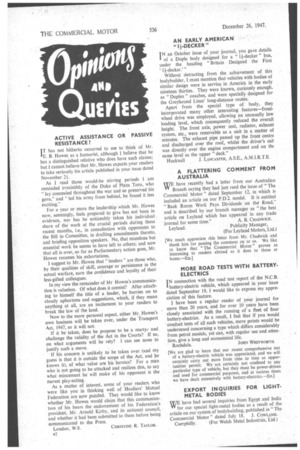ACTIVE ASSISTANCE OR PASSIVE RESISTANCE?
Page 36

If you've noticed an error in this article please click here to report it so we can fix it.
1T has not hitherto occurred to me to think of Mr. E. B. Howes as a humorist, although I believe that he
has a distinguished relative who does have such claims; but I cannot believe that Mr. Howes expects your readers to take seriously his article published in your issue dated November 21.
As I read those would-be stirring periods I am reminded irresistibly of the Duke of Plaza Toro, who "lay concealed throughout the war and so preserved his goro," and "led his army from behind, he found it less exciting." • For a year or more the leadership which Mr. Howes now, seemingly, feels prepared to give has not been in evidence, nor has he noticeably taken his individual share of the work at the crucial periods during these recent months, i.e., in consultation with opponents to the Bill in Committee, in drafting amendments thereto, and briefing opposition speakers. No, that mundane but essential work he seems to have left to others; and now that all is over, so far as Parliamentary action goes, Mr. Howes resumes his exhortations.
I suggest to Mr. Howes that "leaders " are those who, by their qualities of skill, courage or persistence in the actual warfare, earn the confidence and loyalty of their less-gifted colleagues.
In my view the remainder of Mr Howes's communication is valueless. Of what does it consist? After attach ing to himself the title of a leader, he hurries on to cloudy aphorisms and suggestions, which, if they mean anything at all, are an incitement to your readers to break the law of the land.
Now to the more personal aspect, either Mr. Howes's own business will be taken over, under the Transport Act, 1947, or it will not.
If it be taken, does he propose to be a martye and challenge the validity of the Act in the Courts? If so, on what arguments will he rely? I can see none to justify such a move.
If his concern is unlikely to be taken over (and my guess is that it is outside the scope of the Act, and be knows it), of what value are his heroics? For a man who is not going to be attacked and realizes this, to say what mincemeat he will make of his opponent is the merest play-acting.
As a matter of interest, some of your readers, who were like you in thinking well of Hauliers' Mutual Federation are now puzzled. They would like to know whether Mr. Howes would claim that this communication of his bears the endorsement of his Federation's president, Mr. Arnold Kirby, and its national council, and whether it had been submitted to them before being communicated to the Press.
London, W.8. CHRISTINE R. TAYLOR. Et2 AN EARLY AMERICAN " II-DECKER " IN an October issue of your journal, you gave details I of a Duple body designed for a " li-decker " bus, under the heading "Britain Designed the First 1i-decker.'" Without detracting from the achievement of this bodybuilder, I must mention that vehicles with bodies of similar design were in service in America in the early nineteen thirties. They were known, curiously enough, as "Duplex" coaches, and were specially designed for the Greyhound Lines' long-distance routes.
Apart from the special type of body, they incorporated many other interesting features--frontwheel drive was employed, allowing an unusually low loading level, which consequently reduced the overall height. The front axle, power unit, radiator, exhaust system, etc., were removable as a unit in a matter of minutes. The exhaust pipe passed up the front centre and discharged over the roof, whilst the driver's cab was directly over the engine compartment and on the same level as the upper "deck."
Hucknall J. LANCASTER, A.S.E., A.M.I.R.T.E.
A FLATTERING COMMENT FROM AUSTRALIA WE have recently had a letter from our Australian " Branch saying they had just read the issue of "The Commercial Motor" dated September 12, in which is included an article on our P.D.2. model. It is entitled "Back Room Work Pays Dividends on the Road," and is described by our branch manager as "the best article on Leyland which has appeared in any trade journal for some time." A. B. CHADWICK.
Leyland. Publicity Manager, (For Leyland Motors, Ltd.) [We much appreciate this letter from Mr. Chadwick and thank him for passing the comment on to us. We like to know that "The Commercial Motor" proves as interesting to readers abroad as it does to those at home.—ED.] MORE ROAD TESTS WITH BATTERYELECTRICS IN connection with the road test report of the N.C.B. 'battery-electric vehicle, which appeared in your issue dated September 19, I would like to express my appreciation of this feature.
I have been a regular reader of your journal for more than 20 years, and for over 10 years have been closely associated with the running of a fleet, of four battery-electrics. As a result, I feel that if you would conduct tests of all such vehicles, more points would be understood Concerning a type which differs considerably from petrol models, yet can, with regular use and attention, give a long and economical life.
Rochdale. JOHN WHITWORTH.
[We are glad to learn that our recent comprehensive test of a battery-electric vehicle was appreciated, and we will certainly carry out more from time to time as opportunities' permit. We are certainly not confined to any particular type of vehicle, but they Must be power-driven and used for commercial purposes, and at various times we have dealt extensively with battery-electrics.--En.]
EXPORT INQUIRIES FOR LIGHTMETAL BODIES have had several inquiries from Egypt and India for our special light-metal bodies as a result of the article on our system of bodybuilding, published in "The Commercial Motor" dated July 18. J. COWLAND.
Caerphilly. (For Welsh Metal Industries, Ltd.)












































































